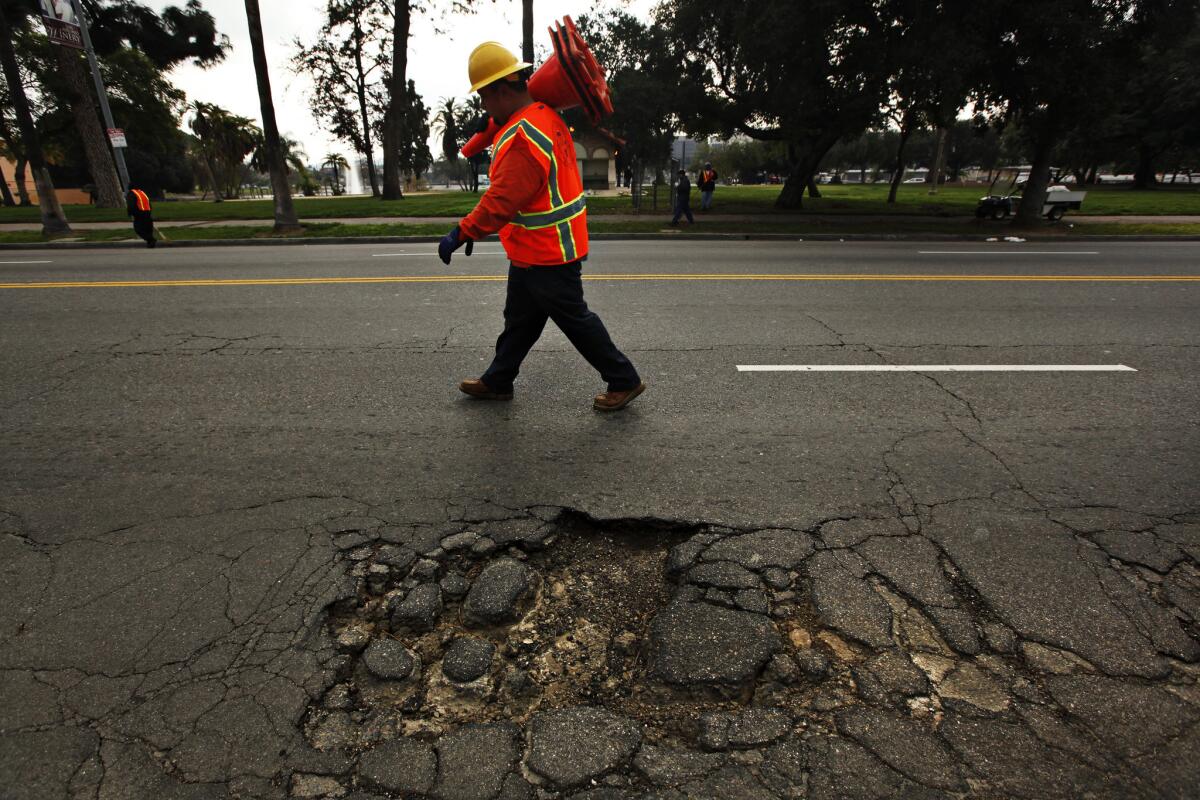Angelenos could tax themselves to fix roads under City Hall proposal

- Share via
Los Angeles residents fed up with rutted roads and buckled sidewalks may soon be able to tax themselves to pay for improvements in their neighborhoods.
A proposal unveiled by Councilman Joe Buscaino at a City Council meeting Wednesday asks city budget officials to draw up plans for “beautification assessment districts,” which would give residents the option of taxing themselves to pay for adjacent road, sidewalk and curb repairs.
“Residents want the opportunity to be part of the solution,” Buscaino said. He told The Times he envisioned the districts being as small as one city block, but could in theory be much larger.
If the City Council approves the study, budget officials will report back with recommendations on how the districts would work and how the taxes would be imposed.
An aide to Buscaino said the districts would have to be approved through a neighborhood election. Fees for tree-trimming, road paving and sidewalk repair could be added to property owners’ annual tax bill. Property owners who already pay for street light installation and maintenance might be able to vote to simply broaden the tax to cover those costs.
The tax-district motion was one of eight introduced Wednesday. The bundle of proposals is aimed at improving Los Angeles’ notoriously bad roads.
Earlier this year, Buscaino and Councilman Mitch Englander abandoned plans to put a sales tax measure on the November ballot that would have raised an estimated $4.5 billion to repair L.A.’s most damaged roads and sidewalks. Streets so damaged that the city has given them a D or F grade make up nearly 40% of L.A.’s streets, or about 8,200 lane miles.
Several of the proposals stem from an audit of the department that maintains city roadways. Controller Ron Galperin’s July report found the Bureau of Street Services kept incomplete records, failed to collect hundreds of millions of dollars and -- in some cases -- didn’t spend the money it had.
Due to miscalculations, City Hall lost $190 million in fees that utility companies should have paid over 15 years after cutting into city streets, Galperin’s audit found.
One motion that Buscaino and Englander co-authored would recalculate that fee structure, with the goal of fully reimbursing the city for all repairs linked to utility work. Another would extend the ban on cutting into a newly paved street to three years from one year.
In an interview after a news conference Wednesday, L.A. Mayor Eric Garcetti said it would be difficult to keep track of every independent utility contractor who works on L.A. streets.
“It’s such a huge city,” Garcetti told The Times. “It’s easy to have scofflaws.”
He added that the city is working on a database that will show residents what agencies are doing work on their streets, and when.
Another proposal would make it easier for city officials to know how much money private parking operators are making.
The 10% tax that parking lots and garages are supposed to charge generates about $85 million a year for L.A.’s general fund, the pool of money that pays for basic services. But officials don’t always know whether cash-only businesses are paying the correct amount.
“What happens to that money that’s supposed to go to the city? It doesn’t!” Galperin said.
The motion would require parking operators to either accept credit and debit cards or install another machine that tracks costumer volume, such as electronic gates or lanes with mechanical arms. That information could lead to $20 million to $25 million more a year in revenue, aides said.
For more Los Angeles transportation news, follow @laura_nelson on Twitter.
More to Read
Sign up for Essential California
The most important California stories and recommendations in your inbox every morning.
You may occasionally receive promotional content from the Los Angeles Times.











